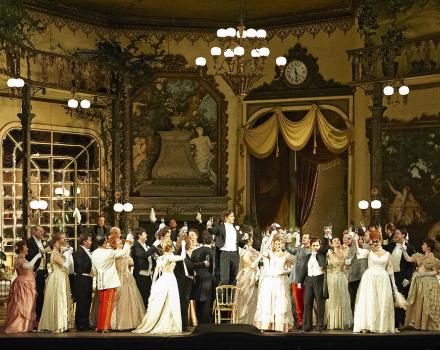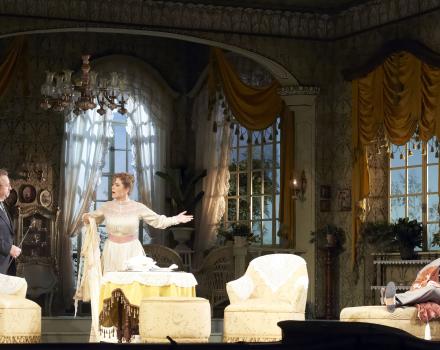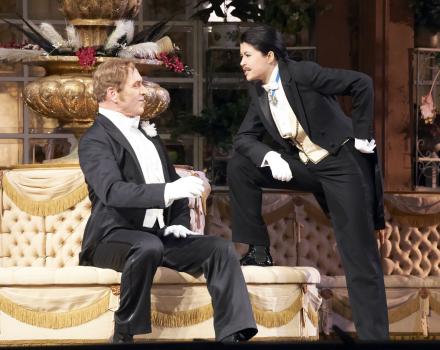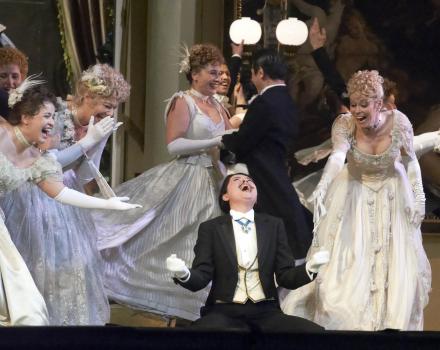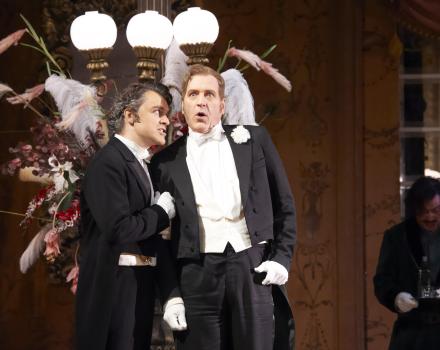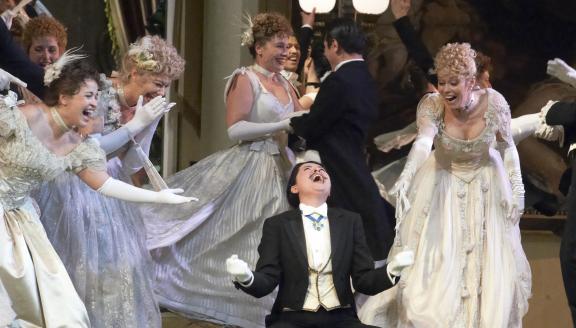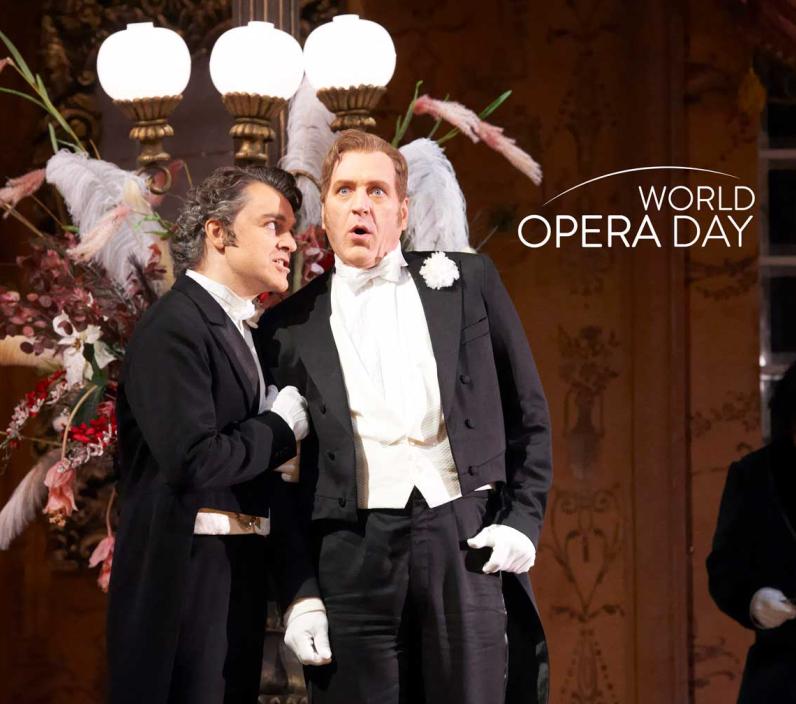

Die Fledermaus

To avoid serving his prison sentence, a fashionable socialite sneaks off to a lavish party. The champagne flows as guests waltz the night away, but several of them have something to hide.
This internationally renowned production by Otto Schenk takes the audience on a bumpy ride through all kinds of intrigues, clothing mix-ups and mistaken identities, until we finally reach a rather hung-over happy ending. Conducted by Franz Welser-Möst and streamed on Strauss’ birthday, this performance is part of OperaVision’s events celebrating the inaugural World Opera Day on 25 October 2019.
Cast
|
Gabriel von Eisenstein
|
Kurt Streit
|
|---|---|
|
Rosalinde
|
Michaela Kaune
|
|
Frank
|
Alfred Šramek
|
|
Prinz Orlofsky
|
Zoryana Kushpler
|
|
Alfred
|
Rainer Trost
|
|
Dr. Falke
|
Markus Eiche
|
|
Dr. Blind
|
Peter Simonischek
|
|
Adele
|
Daniela Fally
|
|
Ida
|
Lydia Rathkolb
|
|
Frosch
|
Peter Jelosits
|
|
Chorus
|
Choir of the Wiener Staatsoper
|
|
Orchestra
|
Orchestra of the Wiener Staatsoper
|
| ... | |
|
Music
|
Johann Strauss
|
|---|---|
|
Text
|
Richard Genée and Karl Haffner
|
|
Conductor
|
Franz Welser-Möst
|
|
Director
|
Otto Schenk
|
| ... | |
Video
The story
Act I
The chambermaid Adele is invited (or so she believes) by her sister Ida to attend a ball given by Prince Orlofsky. After some difficulty she succeeds in getting the night off by inventing a moving story about a sick aunt. Meanwhile her employer, Eisenstein, a man of independent means, has recently been given a prison sentence for insulting a public official. But rather than reporting to serve the sentence, he is persuaded by his friend Dr. Falke to join him for a night of revelry at Orlofsky’s. Dr. Falke is following his own agenda – Eisenstein once humiliated him in front of the whole town by leaving him to return home from a masked ball through the streets, drunk and dressed as a bat, and Falke now sees his opportunity for revenge; and so he also invites Eisenstein's wife Rosalind to the ball. Due to Eisenstein’s departure ‘for prison’, Rosalind is already in disarray when a former admirer of hers named Alfred shows up and tries to woo her, only to be arrested by prison governor Frank who takes him for Eisenstein. Frank, satisfied by a job well done, then also decides to attend Orlofsky's ball.
Act II
At the ball, Dr. Falke’s machinations play out splendidly: to Eisenstein’s astonishment he meets his chambermaid Adele, who brazenly denies her identity; he befriends a French ‘chevalier’ – in truth none other than prison governor Frank; and finally he falls in love with his own wife, masked and disguised as a Hungarian countess.
Act III
The knots begin to unravel. The action takes place at the prison, a rather shady affair thanks to Frosch, the permanently drunk gaoler. One by one, the characters reappear: first prison governor Frank, extremely hungover, then Adele, who is hoping to find a patron to foster her dramatic talent, along with her sister Ida, and then Eisenstein, who is astonished to find that he has apparently been locked up all night. When Rosalind also appears and, together with Alfred, demands an interview with a lawyer, Eisenstein dons a disguise and takes the place of the stuttering lawyer Dr. Blind. This trick allows him to get to the bottom of the previous evening’s events. Fortunately, he then allows himself to be convinced that everything was a part of Dr Falke’s plot for revenge; and so it all ends happily, and Adele even finds her patron in the form of Prince Orlofsky.
Insights
5 things to know about Die Fledermaus
1. A musical family
Johann Strauss I forbade his three sons from pursuing musical careers. He beat the younger Johann when he found him playing the violin and intended for him, Josef and Eduard to have careers in banking, the military and the diplomatic service respectively. Definitely, they all became musicians. Johann Strauss II began writing for the stage in 1871, when he realised that he could have the same success in Viennese operetta as Jacques Offenbach had in Paris. By the end of his life, he had started 18 operettas and finished 16, of which 15 were staged. His single opera, Ritter Pázmán, was a flop, and he died before completing his only ballet, Aschenbrödel.
2. Light-hearted relief
Though Strauss’s first two operettas achieved respectable currency around German-speaking countries, it was little compared to what was to come with his third, Die Fledermaus. Premiered in April 1874 at the Theater an der Wien, it soon established itself as one of the mainstays of musical life in the city, a welcome alternative to the symphonies of Beethoven, the operas of Wagner and the chamber music of Brahms. Strauss composed it in a mere six weeks to take the minds of the Viennese off the Black Friday stock exchange crash of 1873.
3. Too French for Vienna
Die Fledermaus had its origins in a French comedy by Henri Meilhac and Ludovic Halévy, who had provided a number of librettos for Offenbach. Le Réveillon (a term signifying a Christmas Eve or New Year’s Eve supper party) had been produced at Paris’s Théâtre Royal in 1872. It already had a fair amount of incidental music, including melodies from Donizetti’s La Favorite and Rossini’s Guillaume Tell. The centrepiece of the French comedy was an intimate supper party with a young lady of easy virtue who proceeds to seduce the hero – a tale too indecorous for anywhere but Paris during the 1870s. For Vienna, the ingenious solution was to turn the midnight supper into a grand Viennese ball where the masked woman that Eisenstein is attracted to turns out to be his own wife. The offensive aspects of the original play were thus replaced with a situations that were harmlessly amusing.
4. Musical traditions
Since New Year’s Eve 1900, Die Fledermaus has appeared on the Wiener Staatsoper’s programme at the end of every year, becoming a treasured highlight of Vienna’s musical entertainment calendar. This internationally renowned production by Otto Schenk takes the audience on a bumpy ride through all kinds of intrigues, clothing mix-ups and mistaken identities, until we finally reach a rather hung-over happy end. It is conducted by Franz Welser-Möst, who in 2011 and 2013 had the honour of leading the city’s other big classical music event of that time of year, the Vienna New Year’s Concert, joining Herbert von Karajan, Carlos Kleiber and Nikolaus Harnoncourt as the only Austrians since Willi Boskovsky to have conducted the illustrious event.
5. World Opera Day
This performance from the Wiener Staatsoper is streamed on Strauss’s birthday as part of OperaVision’s series of events celebrating the inaugural World Opera Day on 25 October 2019. This initiative is an awareness campaign about the positive impact and value of opera for society. Opera, like other arts, contributes to developing tolerance and understanding, opening minds and connecting people with strong, universal emotions. Just as sport shapes a healthy body, the arts shape a healthy mind.
Gallery
